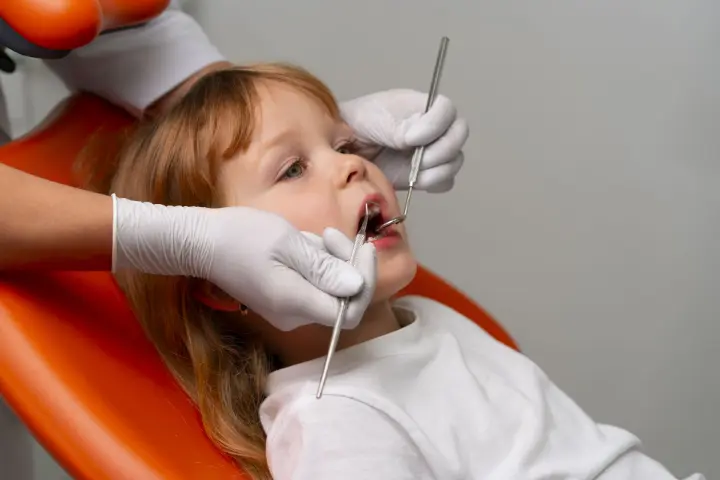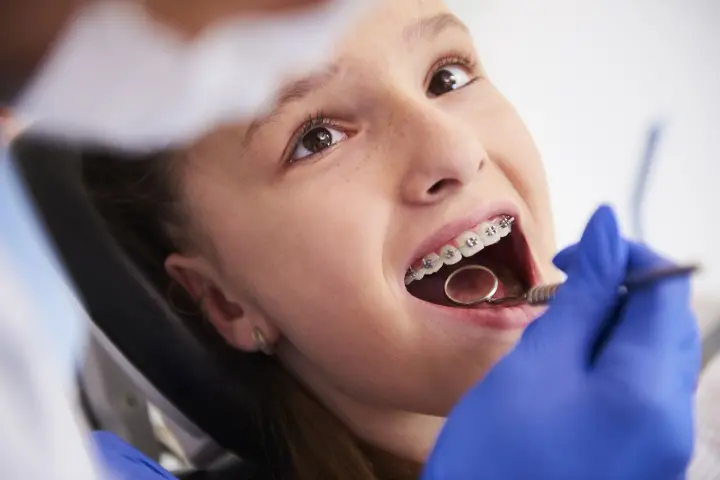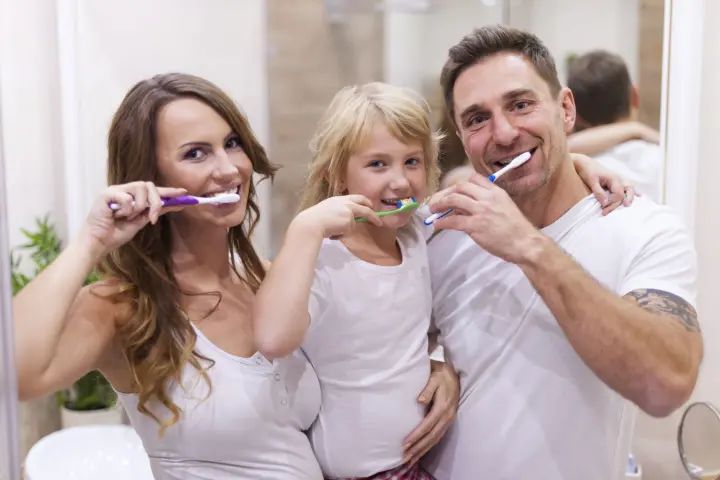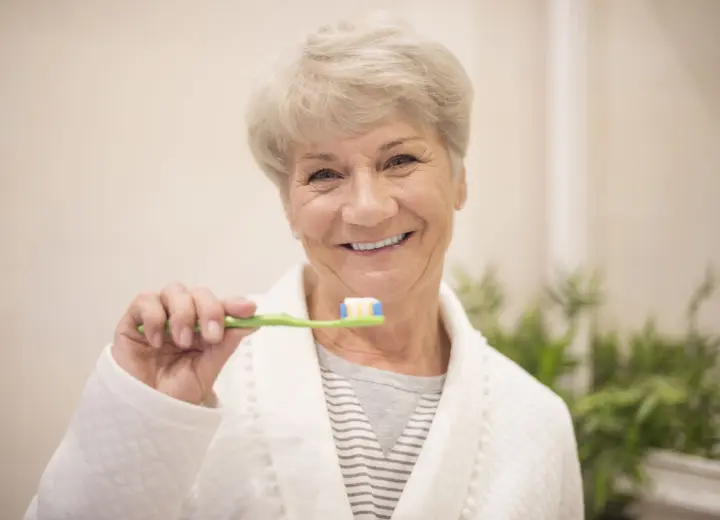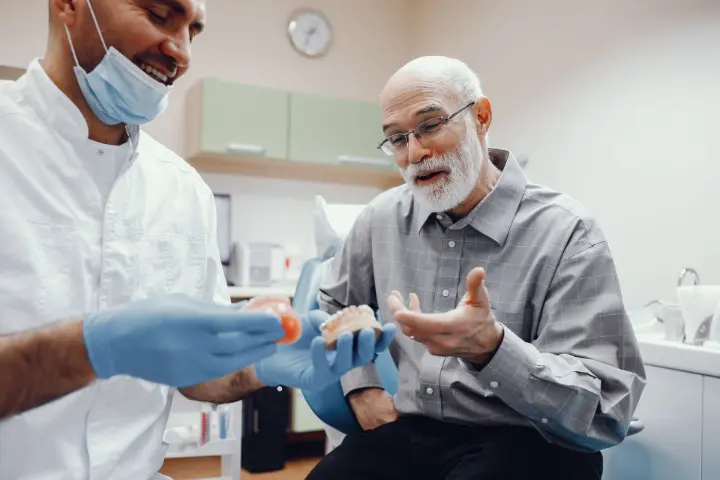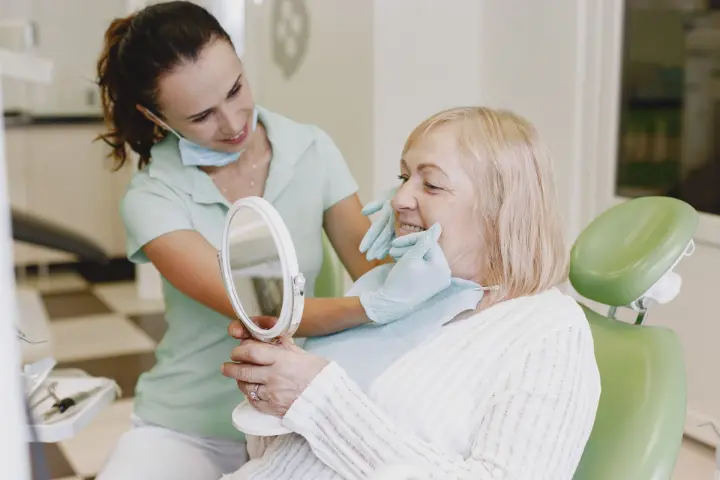Your dental needs evolve significantly throughout life, requiring different approaches to care as you progress from childhood through your senior years. What works perfectly at age 7 may prove inadequate at 47, while the products and techniques ideal for a teenager might be inappropriate for someone in their 70s.
At Vident Dental Clinic, we recognize that effective oral health strategies must adapt to your changing physiology, lifestyle factors, and risk profiles. This comprehensive guide provides stage-specific recommendations to help you maintain optimal dental health throughout every phase of life.
The Foundation Years: Caring for Children's Developing Smiles
Children's dental care focuses on establishing healthy habits while protecting developing teeth and supporting proper oral growth. These formative years set the stage for lifelong oral health.
Infants and Toddlers (0-3 Years)
Even before the first tooth appears, oral care plays a crucial role in development:
Essential Care Practices:
- Gum cleaning: Gently wipe gums with a soft, damp cloth after feedings
- First tooth care: Begin brushing with a rice-sized amount of fluoride toothpaste upon eruption
- Initial dental visit: Schedule the first appointment by the first birthday
- Bottle habits: Avoid putting infants to bed with bottles containing anything but water
- Sippy cup transition: Move from bottles to cups around 12 months to reduce decay risk
Recommended Products:
- Silicone fingertip brushes for infant gums
- Ultra-soft toothbrushes with small heads designed for babies
- Fluoride toothpaste (just a smear) specifically formulated for infants
- Teething rings kept in the refrigerator (not freezer) for discomfort
Special Considerations:
- Monitor pacifier and thumb-sucking habits, which should naturally diminish by age 3
- Be vigilant about "nursing bottle decay" patterns on upper front teeth
- Consider fluoride status of your water supply and discuss supplements if needed
Early Childhood (4-7 Years)
This period sees the completion of the primary dentition and the beginning of the transition to permanent teeth:
Essential Care Practices:
- Supervised brushing: Assist with brushing twice daily for two minutes
- Flossing introduction: Begin flossing when teeth touch (typically by age 4)
- Fluoride balance: Use pea-sized amount of fluoride toothpaste
- Regular checkups: Maintain biannual dental visits
- Sealant evaluation: Discuss dental sealants as permanent molars emerge
Recommended Products:
- Toothbrushes with easy-grip handles and fun designs to encourage use
- Flavored floss or floss picks designed for children
- Timer apps or brushes with built-in timers to ensure adequate brushing time
- Fluoride toothpaste with child-friendly flavors (but not excessively sweet)
Special Considerations:
- Monitor eruption patterns of first permanent molars (around age 6)
- Begin conversations about nutrition and how sugar affects dental health
- Assess space maintenance needs if primary teeth are lost prematurely
- Consider early orthodontic evaluation by age 7 to identify potential issues
Middle Childhood (8-12 Years)
This transitional period involves significant dental changes as permanent teeth replace primary teeth:
Essential Care Practices:
- Independence building: Transition to self-brushing with periodic parental checking
- Proper technique: Emphasize circular motions and reaching all surfaces
- Consistent flossing: Establish daily flossing routine
- Mouthguard use: Provide protection during sports activities
- Orthodontic monitoring: Watch for alignment issues as permanent teeth emerge
Recommended Products:
- Electric toothbrushes to improve cleaning efficiency
- Water flossers as an alternative for children who resist traditional flossing
- Disclosing tablets/solutions to reveal missed areas during brushing
- Fluoride rinses for additional protection (if recommended by your dentist)
Special Considerations:
- Pay special attention to newly erupted permanent teeth, which have immature enamel
- Be vigilant about cleaning around orthodontic appliances if treatment has begun
- Discuss additional fluoride treatments for high-risk children
- Monitor consumption of acidic beverages and sports drinks that can erode enamel
Adolescence: Supporting Oral Health During Transformative Years
Teenagers face unique challenges including hormonal changes, increased independence, and often orthodontic treatment—all while their final permanent teeth are still emerging.
 Early Teens (13-15 Years)
Early Teens (13-15 Years)
This period often coincides with puberty and significant growth:
Essential Care Practices:
- Thorough brushing: Focus on gumline cleaning as hormonal changes increase gingivitis risk
- Consistent flossing: Emphasize interdental cleaning, especially with orthodontics
- Conscious nutrition: Discuss impact of dietary choices on both general and oral health
- Wisdom teeth monitoring: Begin evaluation of third molar development
- Tobacco/vaping prevention: Address risks of all forms of nicotine products
Recommended Products:
- Orthodontic-friendly toothbrushes for teens with braces
- Interdental brushes or water flossers for cleaning around appliances
- Anti-gingivitis toothpastes containing stannous fluoride
- Travel-sized oral hygiene kits for school and activities
Special Considerations:
- Address increased gingivitis risk due to hormonal changes
- Provide strategies for managing orthodontic discomfort
- Discuss oral implications of certain medications (including acne treatments)
- Monitor acidic beverage consumption, particularly sports drinks and sodas
Late Teens (16-19 Years)
This transitional period involves increasing independence and responsibility:
Essential Care Practices:
- Self-management: Transfer full responsibility for oral care routine
- Wisdom teeth assessment: Evaluate third molars for potential extraction
- Post-orthodontic retention: Emphasize importance of retainer wear
- Preventive mindset: Establish connection between current habits and future health
- Professional cleaning schedule: Maintain regular hygiene appointments
Recommended Products:
- Higher-end electric toothbrushes with pressure sensors and timers
- Whitening toothpastes (if appropriate and not contraindicated)
- Custom mouthguards for sports participants
- Retainer cleaning products for post-orthodontic care
Special Considerations:
- Address aesthetic concerns that often become more prominent
- Discuss impact of piercings on oral health if relevant
- Provide education on oral manifestations of eating disorders
- Emphasize connection between oral health and overall appearance
Adulthood: Maintaining Oral Health During Busy Years
Adult oral care focuses on preservation, prevention, and addressing the cumulative effects of time on dental structures.
Young Adults (20-35 Years)
Career establishment, relationship formation, and possibly starting families characterize this phase:
Essential Care Practices:
- Consistent home care: Maintain twice-daily brushing and daily flossing despite busy schedules
- Regular professional care: Continue biannual examinations and cleanings
- Stress management: Address potential grinding/clenching related to career and life pressures
- Cosmetic considerations: Discuss options for addressing aesthetic concerns
- Pregnancy considerations: Implement enhanced care during pregnancy (for women)
Recommended Products:
- High-quality electric toothbrushes with multiple cleaning modes
- Expanded interdental cleaning options (floss, water flossers, interdental brushes)
- Night guards for bruxism protection if needed
- Alcohol-free antimicrobial rinses for specific concerns
Special Considerations:
- Address increased periodontal disease risk factors
- Discuss implications of wisdom tooth decisions if not previously addressed
- Provide guidance on dental care during pregnancy and nursing
- Consider professional whitening options if desired
Established Adults (36-50 Years)
This period often involves career peak, family responsibilities, and the first signs of age-related changes:
Essential Care Practices:
- Gum health focus: Increase attention to periodontal care as risk increases
- Restoration maintenance: Monitor existing dental work for signs of wear or failure
- Dry mouth awareness: Address reduced salivary flow related to medications or conditions
- Erosion prevention: Protect enamel from cumulative effects of acidic foods/beverages
- Comprehensive examinations: Consider more detailed periodic assessments
Recommended Products:
- Toothpastes formulated for enamel strengthening and sensitivity
- Higher-fluoride products if recommended for specific risk factors
- Specialized cleaning tools for bridges, implants, or other restorations
- Saliva substitutes if experiencing dry mouth symptoms
Special Considerations:
- Monitor for signs of acid reflux and its impact on dental structures
- Address increasing tooth sensitivity that often emerges during this period
- Discuss cosmetic options for addressing wear, discoloration, or old restorations
- Evaluate bite changes that may result from tooth movement over time
Maturing Adults (51-65 Years)
Career transitions, changing health status, and preparation for retirement often characterize this stage:
Essential Care Practices:
- Intensified home care: Adapt techniques to address recession and exposed root surfaces
- Medication awareness: Monitor oral health effects of various medications
- Restoration decisions: Make strategic choices about replacing aging dental work
- Dry mouth management: Implement comprehensive strategies for reduced salivary flow
- Oral cancer screening: Ensure regular professional examinations
Recommended Products:
- Toothbrushes with softer bristles and enhanced grips
- Specialized toothpastes for root sensitivity and enamel strengthening
- Higher-fluoride products (prescription strength if recommended)
- Xylitol-containing products to help manage dry mouth and decay risk
Special Considerations:
- Address changing dexterity and its impact on cleaning effectiveness
- Discuss implications of retirement on dental insurance coverage
- Consider comprehensive treatment planning for long-term dental stability
- Evaluate connection between emerging health conditions and oral health
Senior Years: Preserving Dental Function for Quality of Life
Maintaining oral health in later years significantly impacts nutrition, social interaction, and overall well-being.
Active Seniors (66-75 Years)
This period often involves retirement adjustment, active grandparenting, and managing health changes:
Essential Care Practices:
- Adapted cleaning techniques: Modify approaches based on dexterity and restoration status
- Increased vigilance: Monitor for new decay, especially around existing restorations
- Dry mouth management: Implement comprehensive strategies for this common issue
- Nutrition consideration: Maintain dental-friendly diet despite changing taste preferences
- Professional partnership: Maintain regular dental visits despite potential mobility challenges
Recommended Products:
- Electric toothbrushes with enhanced grips and pressure sensors
- Floss aids and holders for easier interdental cleaning
- High-fluoride toothpastes (prescription strength if recommended)
- Alcohol-free rinses with fluoride and moisturizing properties
Special Considerations:
- Address impact of arthritis or reduced dexterity on cleaning effectiveness
- Discuss implications of common medications on oral health
- Consider more frequent professional cleanings if self-care becomes challenging
- Evaluate denture fit and condition if applicable
Advanced Seniors (76+ Years)
Maintaining independence, managing multiple health conditions, and preserving quality of life become central concerns:
Essential Care Practices:
- Simplified effective routines: Focus on highest-impact cleaning strategies
- Caregiver education: Provide guidance for assisted oral care when needed
- Xerostomia management: Prioritize dry mouth strategies to prevent rapid decay
- Comfort-focused approach: Balance ideal care with realistic capabilities
- Prosthesis maintenance: Ensure proper cleaning and fit of dentures or implant restorations
Recommended Products:
- Toothbrushes with customized adaptations for grip and control
- Battery-operated cleaning devices that require less dexterity
- Foam swabs as supplements to traditional cleaning for dependent individuals
- Specialized denture cleaning systems if applicable
Special Considerations:
- Adapt care recommendations based on cognitive status and manual dexterity
- Address nutritional implications of dental status
- Consider the oral side effects of multiple medications (polypharmacy)
- Balance ideal treatment with quality of life considerations
Special Situations Across Life Stages
Certain conditions require specialized approaches regardless of age:
Orthodontic Treatment
Whether traditional braces or clear aligners, orthodontic therapy demands enhanced care:
- Specialized brushing techniques around brackets and wires
- Interdental cleaning tools designed specifically for orthodontic appliances
- Fluoride-releasing products to prevent demineralization
- Emergency care kits for managing discomfort or minor issues
Implant Maintenance
Dental implants require specific care approaches:
- Specialized brushes designed to clean around implant abutments
- Non-abrasive cleaning products that won't scratch implant surfaces
- Interdental brushes with plastic-coated wires to prevent scratching
- Professional tools and protocols during hygiene appointments
Dry Mouth Management
This increasingly common condition requires a comprehensive approach:
- Saliva substitutes and moisturizing products
- Frequent sipping of water throughout the day
- Xylitol-containing products to help prevent decay
- Fluoride enhancement through prescription products
- Humidifiers to improve ambient moisture levels
The Vident Approach to Life-Stage Dental Care
At Vident Dental Clinic, we believe effective dental care requires personalization based on your unique needs at each life stage. Our approach includes:
Comprehensive Assessment
We evaluate multiple factors to develop your personalized care plan:
- Current oral health status and risk factors
- Dexterity and capability for different cleaning techniques
- Lifestyle considerations that impact care routines
- Existing restorations and their maintenance requirements
- Medical conditions and medications affecting oral health
Personalized Product Recommendations
Rather than generic advice, we provide specific guidance on:
- The most appropriate type of toothbrush for your situation
- Optimal toothpaste formulation based on your risk factors
- Interdental cleaning tools matched to your anatomy and capabilities
- Supplemental products addressing your specific concerns
Technique Optimization
We ensure you're getting maximum benefit from your oral care routine:
- Chairside demonstration of optimal techniques
- Video resources for reference between visits
- Hands-on practice with guidance from our dental professionals
- Adaptations for physical limitations or special circumstances
Regular Reassessment
As your needs evolve, so should your oral care approach:
- Periodic evaluation of technique effectiveness
- Adjustments based on changing health status
- Updates reflecting advances in dental products and approaches
- Modifications addressing emerging concerns
Conclusion: A Lifetime of Healthy Smiles
Effective oral care isn't static—it evolves as you progress through life's stages. By adapting your approach to address age-specific concerns and challenges, you can maintain optimal dental health throughout your lifetime.
At Vident Dental Clinic, we're committed to partnering with you at every stage, providing the guidance, tools, and professional care you need to keep your smile healthy, functional, and beautiful from your first tooth to your golden years.
We invite you to schedule an appointment to discuss your stage-specific oral health needs and develop a personalized care plan that addresses your unique situation. With the right approach, excellent oral health is achievable at any age.
This article provides general guidance for age-appropriate dental care. For personalized recommendations, please schedule a consultation with our dental team at Vident Dental Clinic.

